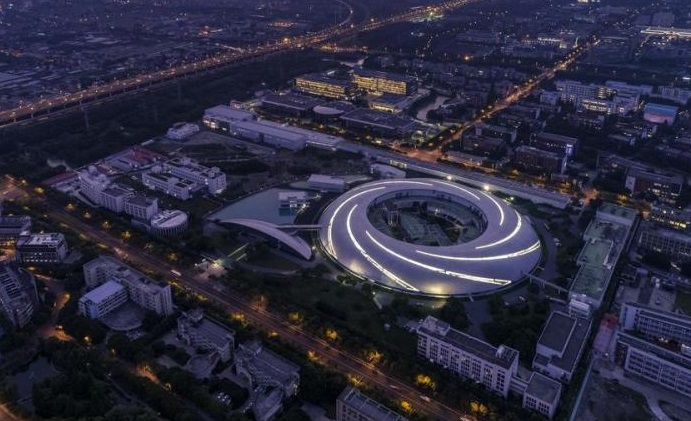China has upgraded the Shanghai Synchrotron Radiation Facility (SSRF), a key sci-tech infrastructure to reveal the mysteries of the microscopic world.
This undated aerial file photo shows a full view of the Shanghai Synchrotron Radiation Facility (SSRF) in Shanghai, east China.
(SSRF/Handout via Xinhua)
The construction of upgrades on the SSRF passed the national inspection and acceptance in east China's Shanghai on Wednesday.
The SSRF, which resembles a nautilus when viewed from above, was officially opened to users on May 6, 2009 as the first third-generation synchrotron light source on China's mainland.
The brightness of the light emitted by the facility is a trillion times higher than that of ordinary X-rays. At the experimental stations of the light source, various samples are illuminated by the synchrotron light, while scientific instruments record information of light-matter interactions. This enables scientists to gain insights into the microscopic world, such as the structure of viruses, and the microscopic architecture and properties of materials, scientists explained.
Construction for upgrades on the SSRF started in November 2016 and was completed in July 2023. It includes 16 state-of-the-art beamlines and experimental stations, auxiliary laboratories, user data centers, support systems and associated facilities, as well as an accelerator performance upgrade, said Tai Renzhong, vice president of the Shanghai Advanced Research Institute of the Chinese Academy of Sciences.
The upgraded SSRF currently has 34 beamlines and 46 experimental stations available to users. "A number of world-class beamlines and experimental stations have been built in the second phase, which has greatly improved the experimental research capabilities of the light source and maximized its efficiency," Tai said.
Scientists have used one of the new beamlines to calibrate instruments installed on China's space station, providing support for space experiments and health assessments for astronauts.
New beamlines have also played an important role in revealing the antiviral effects and mechanisms of drugs, accelerating drug development, and solving the long-term failure mechanism of polymer materials in artificial joints.
"The effectiveness of new beamlines in supporting technological development has already begun to show results," Tai said.
This undated file photo shows the interior of the Shanghai Synchrotron Radiation Facility (SSRF) in Shanghai, east China.
(SSRF/Handout via Xinhua)
Having been in use for 15 years, the SSRF has become an irreplaceable comprehensive research platform in a wide range of fields such as life science, material science, environmental science, earth science, physics, chemistry, and information science. It also serves as a significant means of technological research and development in advanced industries such as pharmaceuticals, new materials, bioengineering and fine petrochemical engineering.
The SSRF has served nearly 800 institutions and over 4,500 research teams, supporting users in completing over 20,000 experimental projects and contributing to the publication of over 11,000 research papers, including more than 220 articles in the internationally renowned academic journals such as Science, Nature and Cell, according to Tai.
The facility has provided customized services to over 100 companies in various fields such as biopharmaceuticals, chemical engineering, new energy and high-performance materials.
The SSRF has also attracted scientists from around the world to come to Shanghai for research purposes. The equipment and technologies developed by the team behind SSRF have been exported to Brazil, the Republic of Korea, Canada and Japan, said Li Aiguo, deputy director of the SSRF's science center.
"The light source will have broad application prospects in cutting-edge research in the fields including energy catalysis, new material creation, innovative drug research and development. It will help promote industrial technological progress and cultivate new quality productive forces," Tai added.Source: Xinhua| 2024-05-15

